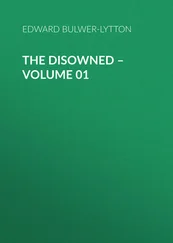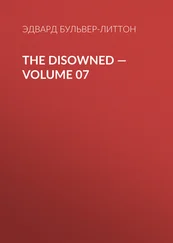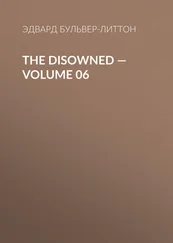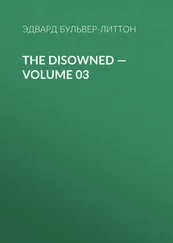Эдвард Бульвер-Литтон - The Disowned — Complete
Здесь есть возможность читать онлайн «Эдвард Бульвер-Литтон - The Disowned — Complete» — ознакомительный отрывок электронной книги совершенно бесплатно, а после прочтения отрывка купить полную версию. В некоторых случаях можно слушать аудио, скачать через торрент в формате fb2 и присутствует краткое содержание. Жанр: foreign_prose, literature_19, Европейская старинная литература, foreign_antique, на английском языке. Описание произведения, (предисловие) а так же отзывы посетителей доступны на портале библиотеки ЛибКат.
- Название:The Disowned — Complete
- Автор:
- Жанр:
- Год:неизвестен
- ISBN:нет данных
- Рейтинг книги:5 / 5. Голосов: 1
-
Избранное:Добавить в избранное
- Отзывы:
-
Ваша оценка:
- 100
- 1
- 2
- 3
- 4
- 5
The Disowned — Complete: краткое содержание, описание и аннотация
Предлагаем к чтению аннотацию, описание, краткое содержание или предисловие (зависит от того, что написал сам автор книги «The Disowned — Complete»). Если вы не нашли необходимую информацию о книге — напишите в комментариях, мы постараемся отыскать её.
The Disowned — Complete — читать онлайн ознакомительный отрывок
Ниже представлен текст книги, разбитый по страницам. Система сохранения места последней прочитанной страницы, позволяет с удобством читать онлайн бесплатно книгу «The Disowned — Complete», без необходимости каждый раз заново искать на чём Вы остановились. Поставьте закладку, и сможете в любой момент перейти на страницу, на которой закончили чтение.
Интервал:
Закладка:
“For your sake, and therefore for mine!” interrupted Isabel, struggling with her tears. “I am a beggar and an outcast. You must not link your fate with mine. I could bear, Heaven knows how willingly, poverty and all its evils for you and with you; but I cannot bring them upon you.”
“Nor will you,” said Mordaunt, passionately, as he covered the hand he held with his burning kisses. “Have I not enough for both of us? It is my love, not poverty, that I beseech you to share.”
“No! Algernon, you cannot deceive me; your own estate will be torn from you by the law: if you marry me, your cousin will not assist you; I, you know too well, can command nothing; and I shall see you, for whom in my fond and bright dreams I have presaged everything great and exalted, buried in an obscurity from which your talents can never rise, and suffering the pangs of poverty and dependence and humiliation like my own; and—and—I—should be the wretch who caused you all. Never, Algernon, never!—I love you too—too well!”
But the effort which wrung forth the determination of the tone in which these words were uttered was too violent to endure; and, as the full desolation of her despair crowded fast and dark upon the orphan’s mind, she sank back upon her chair in very sickness of soul, nor heeded, in her unconscious misery, that her hand was yet clasped by her lover and that her head drooped upon his bosom.
“Isabel,” he said, in a low, sweet tone, which to her ear seemed the concentration of all earthly music,—“Isabel, look up,—my own, my beloved,—look up and hear me. Perhaps you say truly when you tell me that the possessions of my house shall melt away from me, and that my relation will not offer to me the precarious bounty which, even if he did offer, I would reject; but, dearest, are there not a thousand paths open to me,—the law, the state, the army?—you are silent, Isabel,—speak!”
Isabel did not reply, but the soft eyes which rested upon his told, in their despondency, how little her reason was satisfied by the arguments he urged.
“Besides,” he continued, “we know not yet whether the law may not decide in my favour: at all events years may pass before the judgment is given; those years make the prime and verdure of our lives; let us not waste them in mourning over blighted hopes and severed hearts; let us snatch what happiness is yet in our power, nor anticipate, while the heavens are still bright above us, the burden of the thunder or the cloud.”
Isabel was one of the least selfish and most devoted of human beings, yet she must be forgiven if at that moment her resolution faltered, and the overpowering thought of being in reality his forever flashed upon her mind. It passed from her the moment it was formed; and, rising from a situation in which the touch of that dear hand and the breath of those wooing lips endangered the virtue and weakened the strength of her resolves, she withdrew herself from his grasp, and while she averted her eyes, which dared not encounter his, she said in a low but firm voice,—
“It is in vain, Algernon; it is in vain. I can be to you nothing but a blight or burden, nothing but a source of privation and anguish. Think you that I will be this?—no, I will not darken your fair hopes and impede your reasonable ambition. Go (and here her voice faltered for a moment, but soon recovered its tone), go, Algernon, dear Algernon; and if my foolish heart will not ask you to think of me no more, I can at least implore you to think of me only as one who would die rather than cost you a moment of that poverty and debasement, the bitterness of which she has felt herself, and who for that very reason tears herself away from you forever.”
“Stay, Isabel, stay!” cried Mordaunt, as he caught hold of her robe, “give me but one word more, and you shall leave me. Say that if I can create for myself a new source of independence; if I can carve out a road where the ambition you erroneously impute to me can be gratified, as well as the more moderate wishes our station has made natural to us to form,—say, that if I do this, I may permit myself to hope,—say, that when I have done it, I may claim you as my own!”
Isabel paused, and turned once more her face towards his own. Her lips moved, and though the words died within her heart, yet Mordaunt read well their import in the blushing cheek and the heaving bosom, and the lips which one ray of hope and comfort was sufficient to kindle into smiles. He gazed, and all obstacles, all difficulties, disappeared; the gulf of time seemed passed, and he felt as if already he had earned and won his reward.
He approached her yet nearer; one kiss on those lips, one pressure of that thrilling hand, one long, last embrace of that shrinking and trembling form,—and then, as the door closed upon his view, he felt that the sunshine of Nature had passed away, and that in the midst of the laughing and peopled earth he stood in darkness and alone.
CHAPTER XI
He who would know mankind must be at home with all men.
STEPHEN MONTAGUE.We left Clarence safely deposited in his little lodgings. Whether from the heat of his apartment or the restlessness a migration of beds produces in certain constitutions, his slumbers on the first night of his arrival were disturbed and brief. He rose early and descended to the parlour; Mr. de Warens, the nobly appellatived foot-boy, was laying the breakfast-cloth. From three painted shelves which constituted the library of “Copperas Bower,” as its owners gracefully called their habitation, Clarence took down a book very prettily bound; it was “Poems by a Nobleman.” No sooner had he read two pages than he did exactly what the reader would have done, and restored the volume respectfully to its place. He then drew his chair towards the window, and wistfully eyed sundry ancient nursery maids, who were leading their infant charges to the “fresh fields and pastures new” of what is now the Regent’s Park.
In about an hour Mrs. Copperas descended, and mutual compliments were exchanged; to her succeeded Mr. Copperas, who was well scolded for his laziness: and to them, Master Adolphus Copperas, who was also chidingly termed a naughty darling for the same offence. Now then Mrs. Copperas prepared the tea, which she did in the approved method adopted by all ladies to whom economy is dearer than renown, namely, the least possible quantity of the soi-disant Chinese plant was first sprinkled by the least possible quantity of hot water; after this mixture had become as black and as bitter as it could possibly be without any adjunct from the apothecary’s skill, it was suddenly drenched with a copious diffusion, and as suddenly poured forth—weak, washy, and abominable,—into four cups, severally appertaining unto the four partakers of the matutinal nectar.
Then the conversation began to flow. Mrs. Copperas was a fine lady, and a sentimentalist,—very observant of the little niceties of phrase and manner. Mr. Copperas was a stock-jobber and a wit,—loved a good hit in each capacity; was very round, very short, and very much like a John Dory; and saw in the features and mind of the little Copperas the exact representative of himself.
“Adolphus, my love,” said Mrs. Copperas, “mind what I told you, and sit upright. Mr. Linden, will you allow me to cut you a leetle piece of this roll?”
“Thank you,” said Clarence, “I will trouble you rather for the whole of it.”
Conceive Mrs. Copperas’s dismay! From that moment she saw herself eaten out of house and home; besides, as she afterwards observed to her friend Miss Barbara York, the “vulgarity of such an amazing appetite!”
“Any commands in the city, Mr. Linden?” asked the husband; “a coach will pass by our door in a few minutes,—must be on ‘Change in half an hour. Come, my love, another cup of tea; make haste; I have scarcely a moment to take my fare for the inside, before coachee takes his for the outside. Ha! ha! ha! Mr. Linden.”
Читать дальшеИнтервал:
Закладка:
Похожие книги на «The Disowned — Complete»
Представляем Вашему вниманию похожие книги на «The Disowned — Complete» списком для выбора. Мы отобрали схожую по названию и смыслу литературу в надежде предоставить читателям больше вариантов отыскать новые, интересные, ещё непрочитанные произведения.
Обсуждение, отзывы о книге «The Disowned — Complete» и просто собственные мнения читателей. Оставьте ваши комментарии, напишите, что Вы думаете о произведении, его смысле или главных героях. Укажите что конкретно понравилось, а что нет, и почему Вы так считаете.












